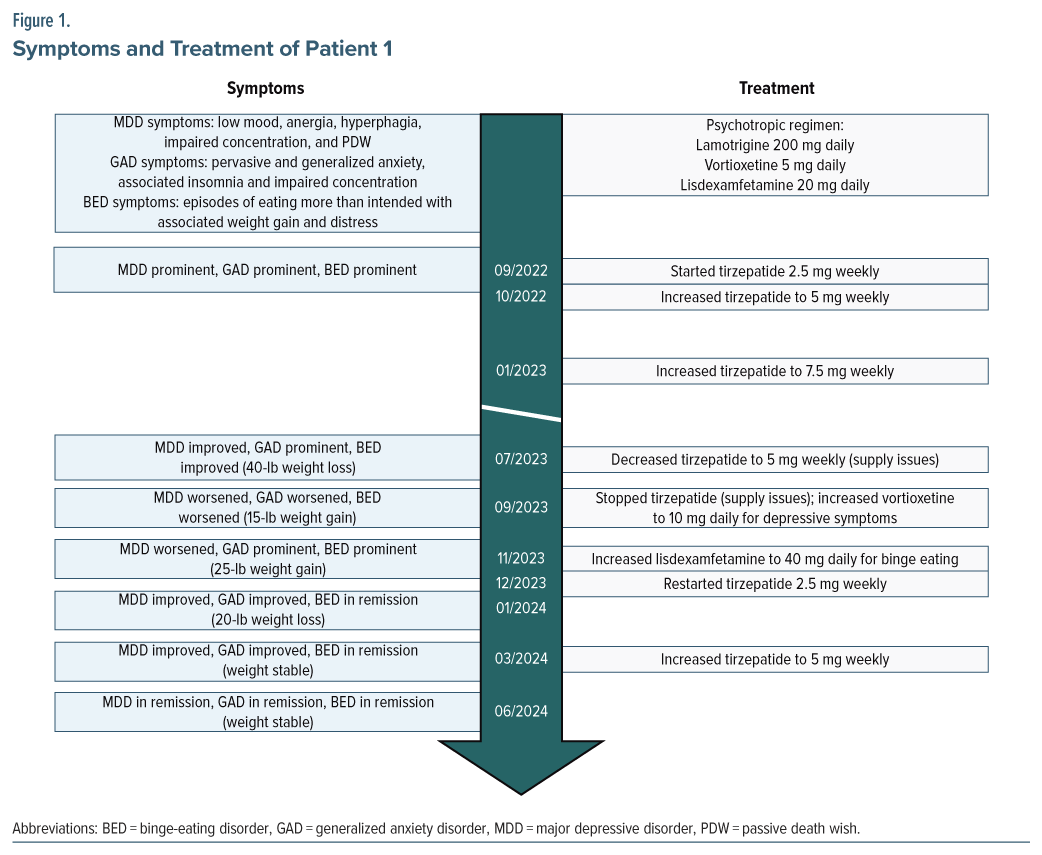Glucagon-like peptide-1 (GLP-1) receptor agonists are known to exert beneficial effects on inflammation, insulin resistance, glycemic control, body weight, and lipid metabolism.1 There is mounting evidence that these drugs may also have positive mental health effects. Exenatide, liraglutide, and semaglutide have been shown to improve depressive symptoms, reduce the incidence of anxiety, and decrease binge-eating symptoms.2–6
The next generation of GLP-1 receptor agonists has a dual action mechanism, targeting both GLP-1 and glucose-dependent insulinotropic peptide (GIP) receptors, and shows greater efficacy for weight loss.7 In a 72-week study, tirzepatide, a GLP-1/ GIP receptor agonist, was more effective at achieving weight loss (20% reduction in body weight) when compared to studies of conventional GLP-1 receptor agonists (15% reduction in body weight).7 However, the mental health effects of GLP-1/GIP receptor agonists have not been described. The cases herein, to our knowledge, are the first to demonstrate potential mental health benefits of tirzepatide, a GLP-1/GIP receptor agonist.
Patient 1
The patient is a 36-year-old college-educated woman with a psychiatric history of major depressive disorder, generalized anxiety disorder, and binge-eating disorder and a medical history of asthma, eczema, and seasonal allergies. Symptoms of each psychiatric disorder are described in Figure 1. This patient demonstrated improvement in psychiatric symptoms with start and titration of tirzepatide and worsening in psychiatric symptoms with taper and discontinuation of tirzepatide (see Figure 1). Of note, this patient endorsed a psychological benefit of tirzepatide, which she felt was unrelated to weight loss.
Patient 2
The patient is a 44-year-old woman with a history of major depressive disorder, attention-deficit/ hyperactivity disorder, generalized anxiety disorder, and obesity. She was on chronic treatment with vortioxetine, dextroamphetamine/ amphetamine salts, bupropion, and buspirone upon initiation of tirzepatide 2.5 mg weekly. At the time, she reported ongoing depressive symptoms. Her Patient Health Questionnaire-9 (PHQ-9)8 score was 14, and weight was 248 lb. There was initially no change in mood and minimal change in weight. At 8 weeks, the tirzepatide dose was increased to 5 mg, leading to rapid improvement in mood within a few days. Sleep also improved along with an increased sense of happiness. After 5 months, she had lost nearly 50 lb, and her PHQ-9 score was 1 (with no change in antidepressant treatment). She reported feeling happy and motivated and more engaged with others. Tirzepatide was subsequently increased to 7.5 mg, leading to additional improvements: the patient reported increased confidence, felt “in the best mood” with a “spring in [her] step,” and had no more negative self-talk. The following month, her tirzepatide dose was lowered to 5 mg due to insurance restrictions. Her mood was subsequently reported as “not as good” but still happy. Of note, she had previously undergone gastric bypass surgery 5 years earlier. Despite a 100-lb weight loss, her depression at the time significantly worsened, leading to entry into a partial hospital program and switching of her antidepressant medications.
Discussion
While there is mounting evidence for the mental health effects of GLP-1 agonists, these cases are the first, to our knowledge, to demonstrate a temporal correlation between administration of tirzepatide, a dual GLP-1/GIP agonist, and improvement in mental health symptoms. Research suggests that GLP-1 agonism may reduce inflammation, improve mitochondrial biogenesis, stimulate neurogenesis, exert neurotropic effects, and restore neuronal signaling9 in the central nervous system. In this context, GLP-1 receptor agonists have been linked to improved mental health outcomes, including improvements in depression and anxiety (as measured by standardized scales such as the Hamilton Depression Rating Scale10 and Beck Depression Inventory)11 and improvements in quality of life (as measured by standardized scales such as the Psychological General Well-Being Index12 and Global Assessment of Functioning).10 Further, GLP-1 receptor agonists have been shown to reduce cumulative incidence of anxiety in patients with type I or II diabetes3 and binge-eating symptoms in patients with binge-eating disorder.4–6 It is notable that the positive mental health effects of GLP-1 receptor agonists appear to be independent of weight loss.13
While concerns about the mental health risks of GLP-1 receptor agonists have been raised, evidence is largely inconclusive. There is no cause-and-effect relationship between this class of drugs and suicidality14–16 or increased incidence of psychiatric disorders.15
In the first case, a longitudinal assessment demonstrates clear worsening in symptoms with taper or discontinuation of tirzepatide and clear improvement in symptoms with initiation or titration of tirzepatide. The patient felt her mood improvements were independent of weight loss. Given that the patient’s psychotropic regimen was not modified during this time, it is unlikely that changes to psychiatric symptoms are attributable to the psychotropic medications. Case 2 demonstrates a rapid improvement in mood with tirzepatide dose titration that preceded significant weight loss. Mood improvement also appeared to be dose dependent, ie, mood benefit lessened with lowering of tirzepatide dose. However, any conclusions drawn from these cases may be limited by inability to isolate the positive mental health effects of tirzepatide (as tirzepatide was administrated concurrently with psychotropic medications) and other unidentified factors that may have impacted mood. Further, positive feelings about real or potential weight loss with tirzepatide may have contributed to the observed improvement in psychiatric symptoms.
Conclusion
Mounting evidence suggests that GLP-1 receptor agonists exert beneficial effects on mental health, though little is known about dual GLP-1/GIP receptor agonists. To our knowledge, the cases herein are the first to demonstrate potential mental health benefits of this next-generation class of drugs, as demonstrated by the GLP-1/GIP receptor agonist tirzepatide. Both cases underscore the need for future research into potential psychotropic effects of this novel class of medications.
Article Information
Published Online: July 10, 2025. https://doi.org/10.4088/PCC.25cr03931
© 2025 Physicians Postgraduate Press, Inc.
Prim Care Companion CNS Disord 2025;27(4):25cr03931
Submitted: January 31, 2025; accepted April 7, 2025.
To Cite: Mudd MK, Rado JT. Mental health effects of tirzepatide: a report of 2 patients. Prim Care Companion CNS Disord 2025;27(4):25cr03931.
Author Affiliations: Department of Psychiatry and Behavioral Sciences, Northwestern University Feinberg School of Medicine, Chicago, Illinois (Mudd, Rado).
Corresponding Author: Marta K. Mudd, MD, PhD, Department of Psychiatry and Behavioral Sciences, Northwestern University Feinberg School of Medicine, 676 North Saint Clair St, 11th Floor, Suite 1100, Chicago, IL 60611 ([email protected]).
Relevant Financial Relationships: None.
Funding/Support: None.
Patient Consent: Consent was received from the patients to publish the case reports, and information, including dates, has been de-identified to protect anonymity.
ORCID: Marta Mudd: https://orcid.org/0009-0001-9343-5366; Jeffrey Rado: https://orcid.org/0000-0002-2164-8282
References (16)

- Smits MM, van Raalte DH, Tonneijck L, et al. GLP-1 based therapies: clinical implications for gastroenterologists. Gut. 2016;65(4):702–711. PubMed CrossRef
- Chen X, Zhao P, Wang W, et al. The antidepressant effects of GLP-1 receptor agonists: a systematic review and meta-analysis. Am J Geriatr Psychiatry. 2024;32(1):117–127. PubMed CrossRef
- Tsai WH, Sung FC, Chiu LT, et al. Decreased risk of anxiety in diabetic patients receiving glucagon-like peptide-1 receptor agonist: a nationwide, population-based cohort study. Front Pharmacol. 2022;13:765446. PubMed CrossRef
- Robert SA, Rohana AG, Shah SA, et al. Improvement in binge eating in non-diabetic obese individuals after 3 months of treatment with liraglutide - a pilot study. Obes Res Clin Pract. 2015;9(3):301–304. PubMed CrossRef
- Richards J, Bang N, Ratliff EL, et al. Successful treatment of binge eating disorder with the GLP-1 agonist semaglutide: a retrospective cohort study. Obes Pillars. 2023;7:100080. PubMed CrossRef
- Allison KC, Chao AM, Bruzas MB, et al. A pilot randomized controlled trial of liraglutide 3.0 mg for binge eating disorder. Obes Sci Pract. 2023;9(2):127–136. PubMed CrossRef
- Jastreboff AM, Aronne LJ, Ahmad NN, et al. Tirzepatide once weekly for the treatment of obesity. N Engl J Med. 2022;387(3):205–216. PubMed CrossRef
- Spitzer RL, Kroenke K, Williams JB. Validation and utility of a self-report version of PRIME-MD: the PHQ primary care study. Primary care evaluation of mental disorders. Patient health Questionnaire. JAMA. 1999;282(18):1737–1744. PubMed CrossRef
- Detka J, Głombik K. Insights into a possible role of glucagon-like peptide-1 receptor agonists in the treatment of depression. Pharmacol Rep. 2021;73(4):1020–1032. PubMed CrossRef
- Mansur RB, Ahmed J, Cha DS, et al. Liraglutide promotes improvements in objective measures of cognitive dysfunction in individuals with mood disorders: a pilot, open-label study. J Affect Disord. 2017;207:114–120. PubMed CrossRef
- Idris I, Abdulla H, Tilbrook S, et al. Exenatide improves excessive daytime sleepiness and wakefulness in obese patients with type 2 diabetes without obstructive sleep apnoea. J Sleep Res. 2013;22(1):70–75. PubMed CrossRef
- Best JH, Rubin RR, Peyrot M, et al. Weight-related quality of life, health utility, psychological well-being, and satisfaction with exenatide once weekly compared with sitagliptin or pioglitazone after 26 weeks of treatment. Diabetes Care. 2011;34(2):314–319. PubMed CrossRef
- Grant P, Lipscomb D, Quin J. Psychological and quality of life changes in patients using GLP-1 analogues. J Diabetes Complications. 2011;25(4):244–246. PubMed CrossRef
- McIntyre RS. Glucagon-like peptide-1 receptor agonists (GLP-1 RAs) and suicidality: what do we know and future vistas. Expert Opin Drug Saf. 2024;23(5):539–542. PubMed CrossRef
- Silverii GA, Marinelli C, Mannucci E, et al. Glucagon-like peptide-1 receptor agonists and mental health: a meta-analysis of randomized controlled trials. Diabetes Obes Metab. 2024;26(6):2505–2508. PubMed CrossRef
- FDA. Update on FDA’s ongoing evaluation of reports of suicidal thoughts-or-actions in patients taking a certain type of medicines approved for type 2 diabetes and obesity. Accessed September 5, 2024. https://www.fda.gov/drugs/drug-safety-and-availability/updatefdas-ongoing-evaluation-reports-suicidal-thoughts-oractions-patients-taking-certain-type
Enjoy this premium PDF as part of your membership benefits!






